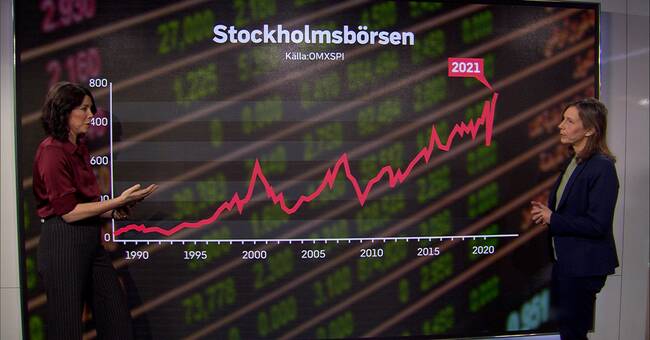The first wave was a tsunami on the stock market.
The stock market plummeted by 30 percent for a few in a few weeks.
Then there were many who trembled for the second corona wave.
A third wave was probably no one who dared to formulate the idea of, let alone talk about.
Then came the second wave, and the third.
The death toll is ticking.
Healthcare is on its knees.
And the stock market - it feels fine.
Tips are flowing in social media
The stock market chill a year ago has been turned into stock market fever.
More and more beginners are investing money in the stock market.
Now a quarter of a million young people between the ages of 21 and 30 are on the stock market.
Wherever you turn, there is someone who wants to talk shares.
And that's not so strange.
If a pandemic can not stop the stock market, what can it do?
Stock tips are flowing in social media.
"Meme stocks" has become a concept since members of the online forum Reddit gathered and increased the price of Gamestop by 1,000 percent.
Alongside these crazy expressions of stock market cap, the industrial giants are thundering with solid profits and, in some cases, even profitability records.
At the same time, the Riksbank predicts zero interest rates until 2024.
The gamestop rush is a warning signal
So what seems more natural for the coronaut bored in front of the screen, than to disconnect thoughts of possible sky-high mortgages or risk of unemployment in the wake of the pandemic crisis, and hang out on stock forums, let yourself be tickled and shop loose on the stock market.
Anyone who got rid of their Gamestop shares on the right day may have earned ten times the money.
But he who waited a few more days saw his imaginary fortune swept away in a race even steeper than the ascent.
The gamestop rush has been followed by several on Reddit.
Last week, it was cannabis stocks that all flocked around, strengthened by rampant legal sales in several US states.
But just like Gamestop, they collapsed as fast as they rushed.
The gamestop rush got a lot of attention and became a warning signal.
But those who invest in more stable companies or funds should also consider the story.
The last time stock fever spread, the epidemic was called the IT frenzy.
It culminated in March 2000. Many associate it with start-up IT consultants such as Framfab and Icon Medialab.
They grew rapidly, stock prices rushed uncontrollably and then crashed completely.
Many small savers were dragged along and lost everything.
But at the same time, a savings race was underway in a stock market giant over 100 years old: the stable public share Ericsson, which has already earned a lot from the introduction of mobile telephony in the world.
But Ericsson was also dragged into the crisis, and was close to bankruptcy.
The stock plummeted and it still has not recovered.
After 21 years.
Two important things to keep in mind
The stock market does not have to collapse now, just as little as last autumn when many, including me, warned about it.
But there are risks.
All support money from governments and central banks must be withdrawn, at exactly the right pace and in the right way so as not to upset what they have inflated and kept going.
Inflation may pick up.
Even if the Governor of the Riksbank here at home is not worried, there is a fear of it in the United States.
This would lead to rising interest rates that could quickly lower the stock market.
Two things are important to keep in mind.
First: do not jump on Redditrusningar, not in cannabis companies and not in anything else either.
It is impossible to know when it's time to quit.
Second: do not borrow to buy shares.
Anyone who enters the stock market now, for fear of not missing the party everyone else seems to be part of, runs a great risk of losing in the short term, or even several years ahead.
Then life will be smoother if a debt to the bank does not become what is left the next day.

